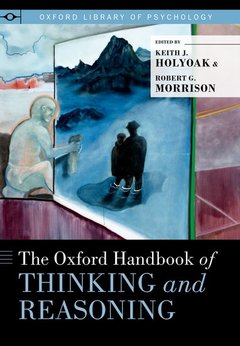Description
The Oxford Handbook of Thinking and Reasoning
Oxford Library of Psychology Series
Coordinators: Holyoak, Ph.D. Keith J., Morrison, Ph.D. Robert G.
Language: English
Subjects for The Oxford Handbook of Thinking and Reasoning:
Publication date: 04-2012
864 p. · 18.6x26 cm · Hardback
864 p. · 18.6x26 cm · Hardback
Description
/li>Contents
/li>Biography
/li>
Thinking and reasoning, long the academic province of philosophy, have over the past century emerged as core topics of empirical investigation and theoretical analysis in the modern fields of cognitive psychology, cognitive science, and cognitive neuroscience. Formerly seen as too complicated and amorphous to be included in early textbooks on the science of cognition, the study of thinking and reasoning has since taken off, brancing off in a distinct direction from the field from which it originated. The Oxford Handbook of Thinking and Reasoning is a comprehensive and authoritative handbook covering all the core topics of the field of thinking and reasoning. Written by the foremost experts from cognitive psychology, cognitive science, and cognitive neuroscience, individual chapters summarize basic concepts and findings for a major topic, sketch its history, and give a sense of the directions in which research is currently heading. Chapters include introductions to foundational issues and methods of study in the field, as well as treatment of specific types of thinking and reasoning and their application in a broad range of fields including business, education, law, medicine, music, and science. The volume will be of interest to scholars and students working in developmental, social and clinical psychology, philosophy, economics, artificial intelligence, education, and linguistics.
1. Thinking and Reasoning: A Reader's Guide. Keith J. Holyoak and Robert G. Morrison. Part I: General Approaches to Thinking and Reasoning. 2. Normative Systems: Logic, Probability, and Rational Choice. Nick Chater and Mike Oaksford. 3. Bayesian Inference. Tom Griffiths, Josh Tenenbaum, and Charles Kemp. 4. Knowledge Representation. Arthur B. Markman. 5. Computational Modeling of Higher Cognition. Leonidas A. A. Doumas and John E. Hummel. 6. Neural Substrate of Thinking. Robert G. Morrison and Barbara Knowlton. 7. Mental Function as Genetic Expression: Emerging Insights from Cognitive Neurogenetics. Adam E. Green and Kevin N. Dunbar. Part II: Deductive, Inductive and Abductive Reasoning. 8. Dual-process Theories of Reasoning: Facts and fallacies. Jonathan St. B. T. Evans. 9. Inference in Mental Models. P. N. Johnson-Laird. 10. Similarity. Robert L. Goldstone, Ji Yun Son. 11. Concepts and Categories: Memory, Meaning, and Metaphysics. Lance J. Rips, Edward E. Smith, and Douglas L. Medin. 12. Causal Learning and Inference. Marc Buehner and Patricia W. Cheng. 13. Analogy and Relational Reasoning. Keith J. Holyoak. 14. Explanation and Abductive Inference. Tania Lombrozo. 15. Rational Argument. Ulrike Hahn, Mike Oaksford. Part III. Judgment and Decision Making. 16. Decision Making. Robyn A. LeBoeuf, Eldar Shafir. 17. Judgment Heuristics. Dale Griffin. 18. Cognitive Hierarchies and Emotions in Behavioral Game Theory. Colin Camerer and Alec Smith. 19. Moral Judgment. Michael Waldmann, Jonas Nagel, and Alex Wiegmann. 20. Motivated Thinking. Daniel C. Molden and E. Tory Higgins. Part IV. Problem Solving, Intelligence, and Creative Thinking. 21. Problem Solving. Miriam Bassok and Laura R. Novick. 22. On the Distinction between Rationality and Intelligence: Implications for Understanding Individual Differences in Reasoning. Keith E. Stanovich. 23. Cognition and the Creation of Ideas. Steve M. Smith and Tom B. Ward. 24. Insight. J. Jason van Steenburgh, Jessica I. Fleck, Mark Beeman, and John Kounios. 25. Genius. Dean Keith Simonton. Part V. Ontogeny, Phylogeny, Language and Culture. 26. Development of Thinking in Children. Susan A. Gelman and Brandy N. Frazier. 27. The Human Enigma. Derek Penn and Dan Povinelli. 28. Language and Thought. Lila Gleitman, Anna Papafragou. 29. Thinking in Society and Culture. Tage Rai. Part VI. Modes of Thinking. 30. Mathematical Cognition. John Opfer and Robert Siegler. 31. Visuospatial Thinking. Mary Hegarty and Andrew T. Stull. 32. Gesture in Thought. Susan Goldin-Meadow and Susan Wagner Cook. 33. Impact of Aging on Thinking. Shannon McGillivray, Michael C. Friedman, and Alan D. Castel. 34. The Cognitive Neuroscience of Thought Disorder in Schizophrenia. Peter Bachman and Tyrone D. Cannon. Part VII. Thinking in Practice. 35. Scientific Thinking and Reasoning. Kevin N. Dunbar and David Klahr. 36. Legal Reasoning. Barbara A. Spellman and Fred Schauer. 37. Thinking and Reasoning in Medicine. Vimla L. Patel, Jose F. Arocha, and Jiajie Zhang. 38. Thinking in Business. Jeffrey Lowenstein. 39. Musical Thought. William Forde Th
Keith J. Holyoak, Ph.D., is a Distinguished Professor of Psychology at the University of California, Los Angeles. Robert G. Morrison, Ph.D., is Assistant Professor of Psychology and Neuroscience at Loyola University Chicago.
© 2024 LAVOISIER S.A.S.




